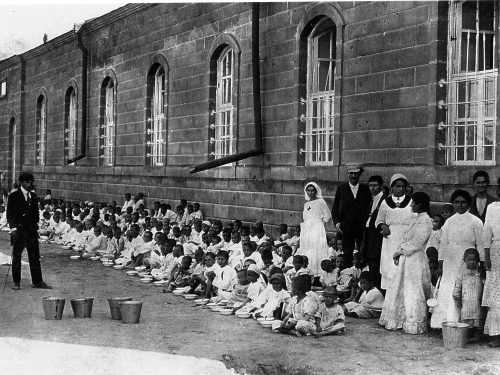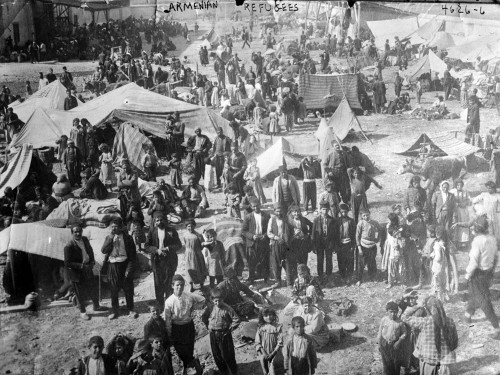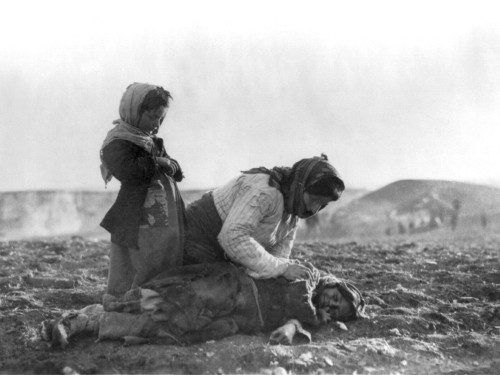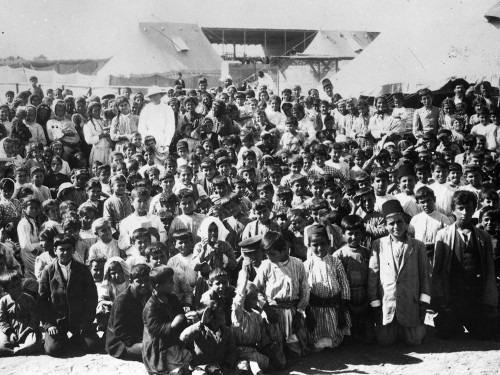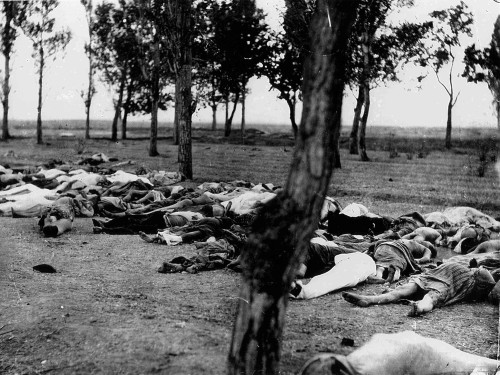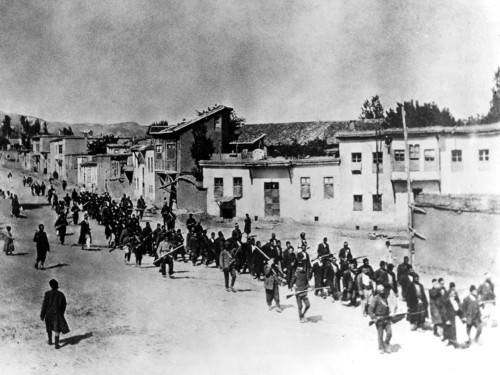Armenian Genocide - Education & Overview
The Armenian Genocide was the centrally planned and systematically executed deportation and murder of over 2 million Christian Armenians, Greeks and Assyrians by the Ottoman Turkish Government from 1915-1923.
Despite overwhelming documentation by historians and condemnation by over 25 countries worldwide, an unrepentant Turkey seeks to both enforce an international gag-rule against truthful affirmation of the Armenian Genocide and to obstruct a just international resolution of this still unpunished crime.
Armenian & Ottoman Empire Historical Background
- Armenia was the first nation to adopt Christianity as its state religion in 301 A.D. The subsequent persecution of Armenians throughout the centuries stemmed, to a meaningful degree, to their refusal to renounce Christianity.
- Prior to the Armenian Genocide of 1915, the territory of modern-day Turkey was home to a large, ancient, and indigenous Christian population, comprised of millions of Armenians, Greeks, Pontians, Assyrians, Chaldeans, Syriacs, and other Christian peoples. Today, Christians account for less than .1% of Turkey’s population.
- As a result of the state-ordered and implemented campaign of genocide, the Ottoman Empire killed over 1,500,000 Armenian men, women, and children, exiled the Armenian nation from its historic homeland, and destroyed and deported hundreds of thousands of its other Christian Assyrian and Greek citizens.
- The Armenian Genocide (1915-1923) was preceded by Turkish massacres of Armenians in 1909 and 1894-1896, during which hundreds of thousands of Armenians were murdered.
- Armenian massacres were widely reported in the U.S. press. During 1915 alone, the New York Times published over 140 articles about the mass murder of the Armenian people, describing the massacres as “systematic and “organized by the government.”
- In 1918, Theodore Roosevelt called the Armenian massacres “the greatest crime of the war.” In President Herbert Hoover’s memoirs, he wrote, “Probably Armenia was known to the American school child in 1919 only a little less than England … and the Sunday School collections of over fifty years for alleviating their miseries.” President Woodrow Wilson, who called for a mandate over Armenia, stated, “At their hearts, this great and generous people [the Americans] have made the case of Armenia their own.”
- The media attention resulted in a mass outpouring of U.S. humanitarian assistance through the congressionally-mandated Near East Foundation that collected over $2 billion (in today’s dollars) from over 40 individual state committees throughout the country that were often chaired by governors whether they were from Alabama or South Dakota.
- The Allied Powers, England, France, and Russia, jointly issued a statement in May of 1915 explicitly charging the Ottoman Turkish Empire with committing “a crime against humanity” and pledging to punish the perpetrators.
- Adolf Hitler was emboldened by the world’s failure to punish Turkey for its mass murder of Armenians. On ordering his commanders to attack Poland without provocation in 1939, he dismissed objections by saying “[w]ho, after all, speaks today of the annihilation of the Armenians?”
- Surviving Christians, today, represent only a tiny fraction of Turkey’s population, Armenians are prohibited from praying in most of their churches, state policies interfere with their religious training, and it is punishable under law to discuss or write about the Armenian Genocide in Turkey. In addition, Turkey blockades landlocked Armenia and openly threatens countries, educational institutions, and media around the world who dare to “speak today of the annihilation of the Armenians.”
Reasons to Reject Turkey’s Denial
- American values: Morally, it is wrong for the American people to serve as an accomplice in the Turkish government’s campaign to cover up the murder of over 1.5 million people. Moreover, President Obama has identified genocide prevention as a “core national security interest and core moral responsibility” of the United States. Yet, out of fear of Turkish retribution, the President uses euphemistic language to sanitize the brutality of the genocide and Administration officials, who dare to use the word “genocide,” risk being forced out as former U.S. Ambassador to Armenia John Evans was in 2006. As Americans, we should never outsource our nation’s foreign policy – or our morality – to Turkey or any other nation. It serves neither our values nor our long term interests.
- Honor a proud chapter in American history: Turkey’s effort to deny Armenian Genocide education and recognition also seeks to erase a proud chapter in American history, including: American Red Cross Founder Clara Barton’s relief mission to help the Armenian victims of Ottoman massacres; U.S. Ambassador Henry Morgenthau’s courageous protests to the Ottoman Turkish government during the Armenian Genocide; and the leadership of President Woodrow Wilson to help the survivors of the Genocide.
- Promote regional stability: Turkey, by coming to terms with the Armenian Genocide, will remove a source of regional tension and end its over 20 year blockade of landlocked Armenia, lessening the level of distrust and opening the door to the normalization of relations with Armenia. Moreover, to bow to Turkey’s threats will only invite others in that region to threaten the United States.
- Prevent future genocides: It is imperative to publicly acknowledge and provide global education on the Armenian Genocide because Turkey’s denial sets a dangerous precedent that makes future genocides more likely. Adolf Hitler, before invading Poland, silenced the potential reservations of his generals by asking: “Who, after all, speaks today of the annihilation of the Armenians?” In fact, many of the tactics employed by the Ottoman Empire against the defenseless Armenian population are now being used in Darfur today. Furthermore, as the rest of the world is trying to isolate Sudan for its genocidal policies, an unrepentant Turkey has vowed to strengthen relations and military cooperation with Sudan.
- Support Turkish voices calling for recognition: Even in the face of death threats and criminal prosecution, Turkish scholars and writers affirm the Armenian Genocide, including Hasan Cemal, the great grandson of Cemal Pasha, who was one of the masterminds of the genocide. Hasan Cemal condemned the Turkish government’s denial of the Armenian Genocide, calling it “colluding in the crime.” Taner Akcam, a historian at Clark University has published a book, A Shameful Act: The Armenian Genocide and the Question of Turkish Responsibility. Other Turkish scholars, who have affirmed the genocide include Ragip Zarakolu, Ugur Ungor, Mehmet Polatel, Umit Kurt, Ayse Gunaysu, and Fatma Muge Gocek.
U.S. Historical Documentation
- The Armenian Genocide is fully documented in the U.S. archives and through an overwhelming body of first-hand, governmental, and diplomatic evidence.
- The Honorable Henry Morgenthau, U.S. Ambassador to Turkey from 1913-16, wrote in his memoir that, “When the Turkish authorities gave the order for these deportations, they were merely giving the death warrant to a whole race; they understood this well, and, in their conversations with me, they made no particular attempt to conceal this fact. . . I am confident that the whole history of the human race contains no such horrible episode as this. The great massacres and persecutions of the past seem almost insignificant when compared to the sufferings of the Armenian race in 1915.”
- In June 5, 1915, U.S. Consul in Aleppo, Jesse Jackson, wrote to Ambassador Morgenthau, “There is a living stream of Armenians pouring into Aleppo from the surrounding towns and villages, the principal ones being Marash, Zeitoun, Hassanbeyli, Osmania, Baghtche, Adana, Dortyol, Hadjin, etc. . . . The [Ottoman] Government has been appealed to by various prominent people and even by those in authority to put an end to these conditions, under the representations that it can only lead to the greatest blame and reproach, but all to no avail. It is without doubt a carefully planned scheme to thoroughly extinguish the Armenian race.” NA/RG59/867.4016/177.
- On July 24, 1915, in a report to Ambassador Morgenthau, U.S. Consul in Harput, Leslie Davis, reported, “Any doubt that may have been expressed in previous reports as to the Government’s intention in sending away the Armenians have been removed . . . . It has been no secret that the plan was to destroy the Armenian race as a race . . . . Everything was apparently planned months ago.” NA/RG59/867.4016/269.
- In a telegram to Secretary of State Robert Lansing, U.S. Charge d’Affaires Hoffman Philip wrote on October 1, 1916, “The Department is in receipt of ample details demonstrating the horrors of the anti-Armenian campaign. For many months past I have felt that the most efficacious method of dealing with the situation from an international standpoint would be to flatly threaten to withdraw our Diplomatic Representative from a country where such barbarous methods are not only tolerated but actually carried out by order of the existing government.” NA/RG59/867.4016/297.
- The Honorable Abram I. Elkus, who served as the United States Ambassador to the Ottoman Empire from 1916-17, telegrammed the Secretary of State on October 17, 1916, stating “In order to avoid opprobrium of the civilized world, which the continuation of massacres [of the Armenians] would arouse, Turkish officials have now adopted and are executing the unchecked policy of extermination through starvation, exhaustion, and brutality of treatment hardly surpassed even in Turkish history.” NA/RG59/867.4016/299.
Scholarship and Affirmation
- The International Association of Genocide Scholars (IAGS), the pre-eminent academic authority on genocides, has urged Congress to pass Armenian Genocide education and acknowledgement resolutions, writing “We would underscore that the Armenian Genocide is not controversial, but rather is denied only by the Turkish government and its apologists. . . . As crimes of genocide continue to plague the world, Turkey’s policy of denying the Armenian Genocide gives license to those who perpetrate genocide everywhere.”
- The Institute on the Holocaust and Genocide (Jerusalem) and the Institute for the Study of Genocide (NY) have affirmed the historical fact of the Armenian Genocide.
- Numerous Holocaust scholars, among them Nobel Laureate Elie Wiesel, Yehuda Bauer, and Israel Charny, issued a statement on March 7, 2000 stating that the “Armenian Genocide is incontestable historical fact and accordingly urge the governments of the Western democracies to likewise recognize it as such.”
- Over 40 U.S. states have affirmed the Armenian Genocide through resolutions or proclamations and over 20 nations and international bodies have affirmed the Armenian Genocide, including the European Union and NATO allies Belgium, Bulgaria, Canada, Cyprus, France, Greece Italy, Lithuania, Netherlands, Poland, and Slovakia.
- In a 1999 statement, 150 scholars, writers and journalists urged Turkey to recognize the Armenian Genocide. Among signatories to the statement were Deborah E. Lipstadt, David Goldhagen, Henry Louis Gates, Jr., Arthur Miller, Joyce Carol Oates, Grace Paley, Harold Pinter, Susan Sontag, Nobel Laureate Woel Solinka, William Styron, D. M.Thomas, Kurt Vonnegut, and Derek Walcott.
- Israel Charny, the noted genocide and Holocaust scholar and the editor of the respected Encyclopedia of Genocide, has written extensively about the psychology of genocide denial. He has explained that to deny the countless deaths of a known event of genocide is to celebrate the deaths and to intimate that the doctrine of power that brought about the destruction is still in force to be used when opportunity permits. To seek to erase agonizing memories is to mock the sensibilities of the victims and their descendents – to once again victimize the victims.
- Samantha Power, U.S. Ambassador to the U.N. and founding executive director of the Carr Center for Human Rights Policy at Harvard University, wrote, in her Pulitzer Prize-winning book A Problem from Hell: America and the Age of Genocide, about the story of Raphael Lemkin, who coined the word “genocide” and relied on the Armenian massacres as a definitive example of genocide.
